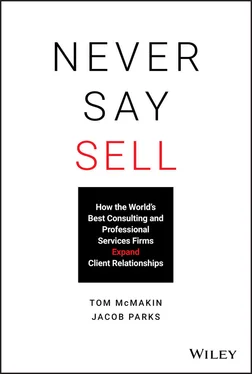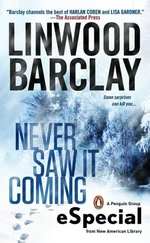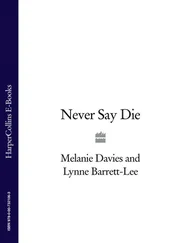By contrast, we think business development is about establishing relationships and listening to clients. It is contingent upon a baseline of trust and credibility, both of which grow as you consistently deliver good work and add value in collaboration.
Economists talk about expert services as being a “credence good.” Credence comes from the Latin word, credere , which means “to give trust to.” A client gives you their trust before they engage with you. Why? Because you know more than they do.
When we hire a cybersecurity firm to protect us from intrusion, their experts know more about cyber-threats and defenses than we ever will. That puts them in a position of power in their relationship with us: They are both diagnosing the problem and making recommendations. Once they peek under the hood of our network, a cyber protection firm might say, we will need to erect a cloud-based firewall monitored by a 24/7 operations desk. Alternatively, they may simply say Windows Defender is fine. We wouldn't know the difference.
That's one of the signal differences concerning goods that are sold on features and attributes like Tom's family's computer and expert services. With goods, we can diagnose the problem. The old laptop is slow, has no battery life left, and weighs more than a three-year-old. When cash loosens up, Tom and Mary decide they need to fix that problem. But with expert services, it's different: We need to trust the provider to tell us the truth about the problem and then right-size a solution.
And so, goods are sold, but expert services are not. With goods, it's helpful to have someone (the salesperson) explain the features and attributes and make comparative claims against the competition. With services, the secret is not in telling but rather in listening. Only by listening do we uncover opportunities where our skills and the trust we have built with clients align and produce mutual opportunity.
This is why we hate the word upselling in connection to expanding our engagement with a client. Saying “May I supersize that for you, Ma'am?” smacks of manipulation and the power of hidden suggestion.
Cross-selling, too, is a word often found in books written about how to more deeply engage with clients. The problem is we are not sure what cross-selling means, exactly. When we cross-sell, are we offering different capabilities to a client, or are we offering the same capabilities across the client organization to different buyers within that organization?
Rather than borrowing words from the world of product sales that are not a perfect fit with expert services, let's start over and actually describe what we are trying to do.
What if we flipped the questions “How should we upsell?” and “How can we cross-sell?” to the much simpler “How can we help?” Even that simple word change invites a mental shift away from a transaction and toward a relationship that looks more like a friendship, encouraging us to imagine what we would do if our client's well-being was our highest priority, which – returning to Walt – is exactly our job.
A couple of additional thoughts about language: We think about ourselves being part of a profession that includes consultants, accountants, lawyers, engineers, and strategists. Rather than repeat that long string, we will refer to those in our profession as “experts” or “expert services providers.” These will serve as umbrella terms to describe those who, like us, offer services built on trust and credibility.
Finally, in addition to the interviews we conducted for this book, we've decided to tell some of our own stories. These stories reflect our collective experience, and they are based on real people and companies we have worked with over the past 25 years. Some names and identifying details of the individuals and companies involved have been changed.
Enough preamble, though, let's dig in.
Section 2: The Imperative and the Opportunity
CHAPTER 2 Learning to Farm
Charlie Mercer was a Blue Devil from before he could remember:
I grew up in Raleigh, and it was a lifelong dream to go to Duke.
A natural athlete in high school, tall and broad-shouldered, Charlie played first baseman on the baseball team and forward on the basketball squad while getting good grades, being in band, and participating in student government – the picture of the well-rounded student.
“It's unbelievable what young people accomplish these days,” Charlie says from his office in the Research Triangle. “They invent something or distinguish themselves in some big way before they even get to college. That wasn't me. I was good at a lot of things but not exceptional at any one thing.”
At Duke, he served as vice president of his fraternity and played in a band called “The Facebook All Stars” while majoring in public policy.
“There's a common theme here,” he says. “Public policy covered everything from economics and leadership to classes on nonprofits and political science. It was the ability to study all sorts of things that drew me into that major.”
In other words, Charlie was ripe to be picked up by a consulting firm after graduation, where the ability to walk into any setting, see patterns, and make a connection with clients is highly prized, and where the ability to lead a team is an important rung on the career ladder.
His first job was with The Advisory Board, after which he joined Stockamp & Associates, a consulting firm that concentrated on healthcare consulting and, specifically, revenue cycle process improvements. Later, the firm was acquired by Huron Consulting.
His strong work at Stockamp earned him a place at North Carolina's Kenan-Flagler School of Business where he got his MBA, joining Deloitte after graduation.
Commenting on his move to Deloitte, Charlie explains,
At Stockamp, we often did the same thing over and over again. After my first year at business school, I interned at a private equity firm. I loved how every day was different. So, it's no surprise I ended up back in consulting, but at a firm where I could explore different industries and work on different projects. When I was at Deloitte, I joined the Strategy and Operations group where I worked on strategy, M&A, and process improvement projects. I was exposed to different types of business problems and saw how those problems compared across industries.
Like a duck in water, Charlie thrived at Deloitte:
Right out of undergraduate, they call you an analyst, but I was hired out of business school. If you do that, they call you a senior consultant. You aren't yet a project manager because you haven't proven yourself. We thought of it as a two-year apprenticeship, but maybe it was a two-year trial! Every project you work on is different. You might be doing analyst work on one project. On another, you might be managing an analyst and responsible for a workstream.
Grinders, Minders, and Finders
In consulting, there are grinders, minders, and finders: those who do the work, those who manage others doing the work, and those who land new work for others to manage. For two years, Charlie was a grinder , trundling from project to project – deep in the salt mines of large projects, doing the work.
But because of that work, and his ability to do it well, he was quickly promoted to manager. He says, “My job as manager was to lead projects. A partner would sell a project and define its scope. As a manager, I'd be responsible for corralling the team and getting them pointed in the right direction to make sure the scope was delivered and it was to the client's liking.”
That's when Deloitte sent him to Deloitte University in Westlake, Texas, where he and his fellow newly minted project managers learned how to set expectations with those on their teams and how to manage them in a way that produced results. They learned how to be minders .
Читать дальше












